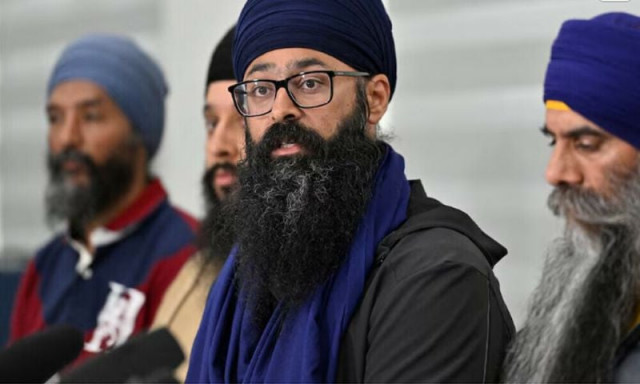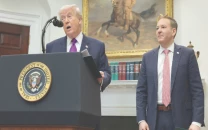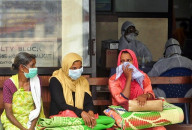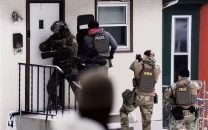Canadian Sikh leader Moninder Singh warned twice of assassination threat from India
These warnings prompted the 43-year-old Canadian to stay away from his home for months at a time from his family

Twice since July 2022, Moninder Singh, spokesperson for a Sikh advocacy group in Canada’s British Columbia province, has had police come to his door in the Vancouver suburb of Surrey.
Twice, Singh said, they warned him that he faced an imminent risk of assassination, though they did not say from whom.
These warnings prompted the 43-year-old Canadian to stay away from his home for months at a time - away from his wife and children, ages 15 and 11.
“India has gotten away with so much over the years and under Modi’s regime, its impunity,” Singh said, referring to Indian Prime Minister Narendra Modi. “They feel like they’re just so powerful that no one’s really going to hold them in check. And they probably have been correct over the past decade or so.” Singh’s experience illustrates the threats that some members of Canada’s Sikh community - the largest outside India’s Sikh-majority Punjab state - are facing at a time of mounting tensions between the governments of India and Canada.
The Royal Canadian Mounted Police, the country’s national police service, said this week it has communicated more than a dozen threats to people like Singh who are advocating for the creation of a Sikh homeland carved out of India. Canada’s Sikhs have been in the spotlight since Prime Minister Justin Trudeau last year accused India’s government of involvement in the June 18, 2023, murder of Hardeep Singh Nijjar, a Sikh separatist leader in Canada and Moninder Singh’s friend, who was shot in Surrey.
India’s government has denied involvement in the killing of Nijjar. India has accused Canada of providing a safe haven for Sikh separatists.
Canada said on Monday it expelled six Indian diplomats, linking them to Nijjar’s murder and alleging a broader effort to target Indian dissidents in Canada through killings, extortion, use of organized crime and clandestine information-gathering. India retaliated by ordering the expulsion of six Canadian diplomats and called the allegations preposterous and politically motivated. Trudeau on Monday said Canada has found “clear and compelling evidence that agents of India’s government have engaged in and continue to engage in activities that pose a significant threat to public safety.”
Royal Canadian Mounted Police spokesperson Camille Boily-Lavoie told Reuters law enforcement agencies have a duty to warn people “who are subjects of a clear, serious and imminent threat of death or serious bodily harm.” Boily-Lavoie declined to provide further details, citing the privacy and safety of those targeted.
The warnings left Singh shaken.
“They don’t tell you who, where - any of those types of things,” said Singh, who serves as spokesperson for the activist group B.C. Gurdwaras Council. “They don’t tell you what to do, really. They just kind of give you an idea that, ‘Hey, we’ve told you now, now you should be warned and you should take precautions.’”
Balpreet Singh, legal counsel for the World Sikh Organization of Canada advocacy group, said the Sikh community has “seen a rise in violence over the past few months in terms of the targeting of Sikh activists, in terms of extortions.”
A midnight visit
It was midnight on an August night when police came to the Brampton, Ontario, home of Inderjeet Singh Gosal, an activist advocating for a Sikh homeland who took over some of Nijjar’s work after his murder. Gosal was not home, but his wife was.
Gosal told Reuters the police asked his wife about his whereabouts and when he had last visited India. Gosal said when police were able to get him on the phone they told him: “We’re here to let you know that there is a threat to your life.”
“My family, they worry. But I know what I signed up for,” Gosal said.
Ontario Provincial Police did not respond to a request for comment concerning Gosal.
Canada expels top India diplomats, links them to murder of Sikh leader
Moninder Singh welcomed Canada’s recent actions.
“The way they’re dealing with it now, I think, is helpful to the community to build some confidence that these things can’t just happen and people just walk away and everything returns to normal,” he said.
He said the most recent warning he received from police is keeping him from taking his two children to school or attending events with them.
“You don’t really want to be around people in general,” Moninder Singh added.
These threats can change a community, he said, including how people interact with one another.
“You’re constantly looking around you,” he said, “wondering if somebody’s coming this way or that way.”



















COMMENTS
Comments are moderated and generally will be posted if they are on-topic and not abusive.
For more information, please see our Comments FAQ